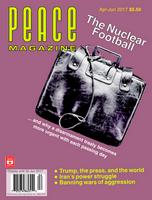
Peace Magazine April-June 2017, page 4. Some rights reserved.
Search for other articles by peacemag here
Four of our articles this time address aspects of a single topic: authoritarianism. Homa Hoodfar and Lema Ijtemaye both depict the mentality of fundamentalism; our book review, Authoritarianism Gone Global, discusses populist dictators’ threat to democracy; and Olivia Ward reflects on dogmatists’ denial of facts.
All of these cognitive patterns constitute a syndrome that was identified in a 1951 study, The Authoritarian Personality, whose authors were Jewish refugees from the Nazis. They measured the traits with a series of questions that they called the “f-scale,” where f stood for “fascism.” Else Frenkel-Brunswik noted that authoritarian persons are prejudiced against other ethnic groups or cultures,tend to resort to black-and-white solutions, leap to judgments rapidly and overconfidently (even by denying reality), and ignore whatever is unfamiliar, complex, or open to conflicting interpretations. She called their cognitive pattern “intolerance for ambiguity.” (Does this portrait remind you of any current political leaders, ayatollahs, or mullahs?)
Later another psychologist, Hans Eysenck, showed people a set of 8 drawings of a dog turning slowly and by degrees into a cat. He found that rigid people continued describing the pictures as a dog long after it had turned into a cat. When reality becomes ambiguous, authoritarians cling to their simplistic interpretations by denying evidence. Today, following Kellyanne Conway, they even call obvious lies “alternative facts.”
Evidently we are seeing a resurgence of populist authoritarianism, and unfortunately psychologists still cannot explain why it is so widespread in the world. The authors of The Authoritarian Personality mostly blamed fascists’ traits on harsh old German styles of parenting, but were shocked to find that when Jews from their own community migrated to Israel, they sometimes developed authoritarian ways too.
The authors of Authoritarianism Gone Global blame the current decline of democracy around the world on the failure of liberal democracies to promote our best values or defend human rights abroad. We have become shy about helping others to liberate themselves, though authoritarian rulers are far from shy. Instead, they interfere with democratic elections and fund TV networks to spread false news. The first victims of an information war are truth and freedom.

Peace Magazine April-June 2017, page 4. Some rights reserved.
Search for other articles by peacemag here